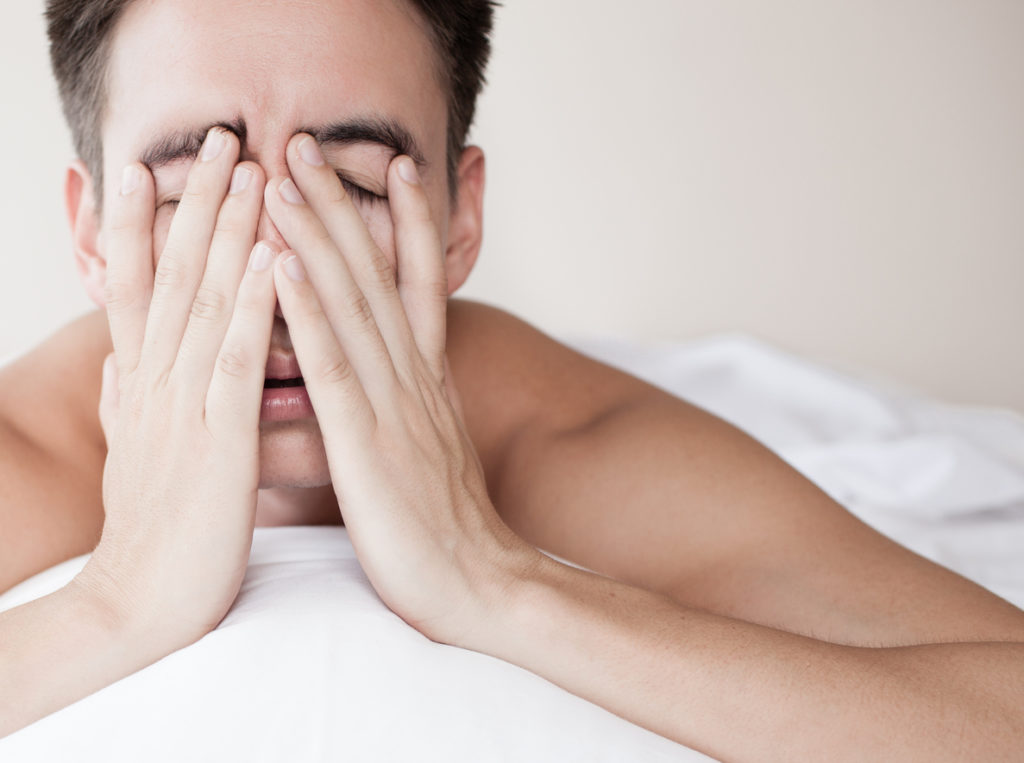We all know we should be getting eight hours kip a night, but how many of us actually achieve it?
Not many, according to the findings of the Great British Sleep survey, which compiled responses from more than 20,000 adults between March 2010 and June 2012, only to reveal that 51% of us aren’t sleeping well.
Somewhat surprisingly, London and Scotland come equal first place in the sleep league, achieving Britain’s highest average sleep scores at 5.6% – compared to a national average of 4.9%.
Women were found on average to have a 10% lower sleep score than men, with 56% of women suffering from long-term poor sleep.
So what’s keeping us awake at night? No, it’s not a PB.
A ‘racing mind’ was found to be the number one cause of sleeplessness in both men and women, with work stress and concerns for the future causing us to toss and turn at night.
The physical factors causing lack of sleep include; bodily discomfort, noise, a (snoring) partner, light levels and room temperature.
The study shows that the daytime energy levels of those who routinely enjoy a good night’s sleep were on average twice as high as those who suffer from lack of sleep.
Lack of sleep was also found to affect mood and mental health with long-term poor sleepers more likely to suffer from depression and mood swings.
If you suffer from poor sleep, the good news is that there are easy steps you can take to improve the quality of your sleep. This is vital to help your body recover and repair effectively from running.
MR top tips for a good night’s sleep
Exercise
It’s simple, really. If you tire yourself out during the day, you’re more likely sleep well at night. You don’t have to get all Mo Farah on us, either. Just 20/30 minutes of light exercise a day – such as walking, running or cycling – can help to improve your ability to drop off and stay asleep, as it is thought to improve the deep sleep cycle. However, avoid exercising late at night: this can make it harder to sleep as endorphins and other chemicals can make the body more alert.
Cut the coffee
Oh, we all love a good cup of coffee. But if you’re looking to get more shut-eye, it’s time to cut down the caffeine. Avoid drinking coffee late at night or even during the afternoon. Instead, drink a warm milky drink packed full of the amino acid tryptophan, which is thought to encourage drowsiness, 30 minutes before bed. Turkey and bananas also contain tryprophan, so consider adding them to your evening menu (but probably not on the same plate).
Go herbal
Once the preserve of the flip-flop-wearing flower-power brigade, herbal teas have grown in popularity – and for good reason. As an alternative to hot milk, try drinking chamomile, passionflower or valerian root herbal teas for a natural and relaxing sedative.
Hit the hot tub
Enjoy a warm bath an hour before bed to relax your muscles and help you mentally switch off. If you’re feeling fruity, try adding a couple of drops of lavender oil to the bath water or to your pillowcase as this can also help promote relaxation and send you off to the land of nod (rose petals and scented candles an optional extra).
Stretch it out
A 20-minute easy yoga session in the evening, which finishes with simple poses, such as child’s or corpse pose, is a good way to stretch out your muscles and get you in the sleep zone.
Laws of distraction
Many of us will suffer from a bad night’s sleep from time to time. So, if you can’t nod off, don’t panic and instead try distracting yourself by reading or listening to music. If that isn’t helping try getting up and completing a small job or chore around the house. The emphasis here is on ‘small’ – that means no DIY kitchen remodelling at 3am – what ever task you set yourself should be achievable within a 15 minute time frame. This technique is especially useful if you’re suffering from the aforementioned ‘racing mind’ brand of sleeplessness, as it will give you a sense of tangible accomplishment. The other half isn’t likely to hate waking up to a cleaner house, either (although we’d recommend you lay off the hoovering until a more civilised hour).







